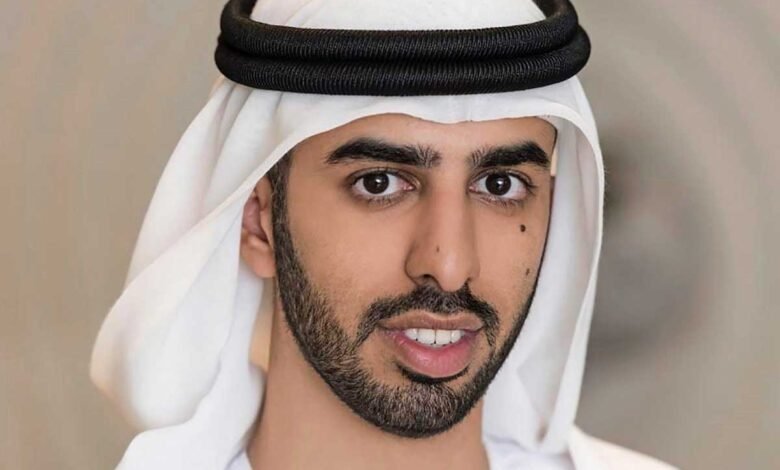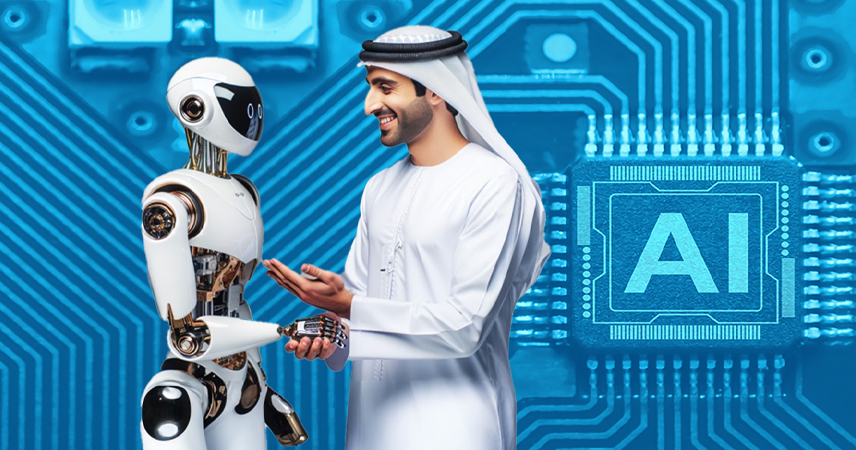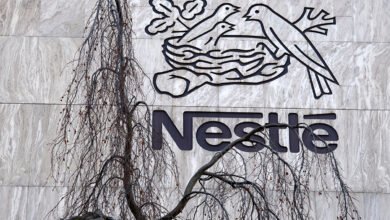
UAE AI Strategy Puts Nation Among World’s Tech Leaders
The UAE has made remarkable progress in the AI race by moving up from 28th to 20th place in the 2024 Global AI Index. This impressive advancement shows the country’s steadfast dedication to emerge as a global artificial intelligence leader. PwC estimates suggest AI will add about 14% to the UAE’s GDP by 2030.
The country’s artificial intelligence strategy aims to add AED 335 billion ($91 billion) to the Emirati economy by 2031. The UAE has established strategic collaborations with major tech companies. Microsoft invested $1.5 billion in G42, a national AI champion. The nation has also partnered with Google and OpenAI to strengthen its position as a world-leading AI hub.
UAE Launches World’s First AI Ministry in 2017

Image Source: Arabian Business
The United Arab Emirates made history in October 2017 by creating the world’s first dedicated ministry for artificial intelligence. This groundbreaking decision placed the Gulf nation among leading global technological governance players and showed its steadfast dedication to becoming a major force in the fourth industrial revolution. The ministry’s creation marked a crucial step in UAE’s detailed strategy to broaden its economy beyond oil dependency.
Omar Al Olama becomes global AI pioneer
Omar bin Sultan Al Olama became UAE’s first Minister of State for Artificial Intelligence at age 27. His appointment created history as he became the world’s first minister focused on AI oversight and development. His expertise in breakthroughs and technology policy made him the perfect fit for this trailblazing role.
Minister Al Olama has driven many initiatives that boosted UAE’s capabilities in artificial intelligence since his appointment. He helped build the foundation for the country’s detailed AI Strategy 2031 through mutually beneficial alliances and policy frameworks.
“AI is the new wave after the Smart Government and we want to be a hub for that,” Al Olama stated shortly after his appointment. His words highlighted UAE’s goals to move beyond traditional governance approaches.
The minister’s role covers several key areas:
- Developing legislation and regulations for AI implementation across sectors
- Creating international partnerships with technology companies and research institutions
- Building national AI capabilities through talent development and education
- Ensuring ethical applications of AI technologies within UAE’s societal framework
The ministry has connected technological breakthroughs with practical applications in healthcare, transportation, education, and government services under Al Olama’s leadership. His groundbreaking role has inspired other nations to create similar ministerial positions, though UAE remains the first country to take this bold step.
Why the UAE made AI a national priority
UAE’s decision to create a dedicated AI ministry came from several key considerations that matched its long-term vision. The leadership saw artificial intelligence as a basic driver of future economic growth and global competitiveness. This insight emerged as projections showed emerging technologies would reshape industries worldwide.
The initiative’s timing proved strategic. UAE’s government identified AI as a key pillar for sustainable economic development as traditional oil-based economies faced pressure to broaden. The country’s small population created unique opportunities to implement AI systems more efficiently than larger nations.
UAE’s government structure, known for its agility and forward-thinking approach, allowed quick deployment of AI initiatives that might face bureaucratic challenges elsewhere. This organizational advantage helped establish the ministry and subsequent policy frameworks rapidly.
Key factors that made AI a national priority:
- Economic Diversification – Reducing dependence on hydrocarbon revenues by developing knowledge-based sectors
- Global Positioning – Establishing UAE as a leading technology hub between East and West
- Government Efficiency – Enhancing public services through AI-powered solutions
- Future-Proofing – Preparing the workforce and economy for technological disruption
The AI Ministry’s establishment matched UAE’s broader “Vision 2021” and “Vision 2071” strategies that outline detailed plans for national development. These visions emphasize breakthroughs, sustainable growth, and placing UAE as a global leader across multiple sectors.
UAE showed remarkable foresight by creating this ministry. They recognized artificial intelligence not just as a technological tool but as a transformative force needing dedicated governance structures. This early institutional commitment has helped the country build momentum in its AI development experience, leading to its improved position in global AI rankings.
UAE Adopts AI Strategy 2031 to Lead Globally

Image Source: LinkedIn
The UAE Cabinet, chaired by His Highness Sheik Mohammed bin Rashid Al Maktoum, adopted the National Artificial Intelligence Strategy 2031 in 2019 after creating the world’s first AI ministry. This detailed plan aims to make the UAE a global AI leader by 2031. The strategy lays the groundwork to achieve UAE’s Centennial 2071 vision of becoming the world’s best country.
Eight pillars of the UAE AI Strategy
The AI Strategy 2031 stands on eight strategic objectives that create its foundation:
- Building a reputation as an AI destination – Making the UAE a preferred global hub for AI development and testing
- Increasing competitive edge in priority sectors – Enhancing key industries through AI deployment
- Developing a fertile ecosystem – Creating an environment that nurtures AI startups, research, and breakthroughs
- Adopting AI across customer services – Making government services more efficient for citizens
- Attracting and training talent – Getting the workforce ready for future AI-enabled jobs
- Bringing world-leading research capabilities – Drawing premier researchers and institutions for collaboration
- Providing data and supporting infrastructure – Building technical foundations needed for AI development
- Ensuring strong governance and effective regulation – Creating robust frameworks for responsible AI deployment
His Highness Sheik Mohammed bin Rashid stated that the UAE “moves ahead with its vision and aspirations through a well-laid-out plan” and launched the AI strategy “to make it an integral part of our business, our lives and our government services”. The Emirates Council for Artificial Intelligence and Digital Transactions oversees the strategy’s implementation while coordinating with local and federal entities.
How the strategy lines up with economic diversification
The AI Strategy 2031 should generate AED 335 billion in economic growth, about 13.6% of the national economy. This growth supports UAE’s broader economic diversification goals, shown by non-oil sectors’ 74% contribution to the national GDP.
The strategy’s first phase targets five priority sectors where AI can create substantial economic and social value:
- Resources and energy – Making production better, especially in renewable energy
- Logistics and transportation – Making air and sea transport operations more efficient
- Tourism and hospitality – Creating tailored services and experiences
- Healthcare – Advancing diagnostics and treatment
- Cybersecurity – Creating strong systems to protect critical infrastructure[83]
The strategy will expand AI applications to education, government services, and community wellbeing beyond these focus areas. This methodical approach shows results already. Stanford Institute for Human-Centered AI ranks UAE third globally in attracting and developing AI talent and among the top five countries in AI competitiveness.
UAE’s AI initiatives have altered the map of its economy. UAE ranks first in the Arab world and second globally in attracting foreign direct investment. The country has become a global destination for businesses focused on breakthroughs, artificial intelligence, and entrepreneurship. The labor market has grown significantly – employee numbers rose by more than 12% and new companies increased by 17% in 2024 alone.
The strategy connects UAE’s oil-rich present to its knowledge-based future. UAE invests in AI infrastructure, research capabilities, and talent development while reducing hydrocarbon dependence and creating new economic opportunities. Projections show UAE will rank third globally in AI’s economic contribution by 2030.
UAE Forms Global AI Alliances with Tech Giants

Image Source: Inside Telecom
The UAE’s artificial intelligence ambitions rely on strategic collaborations with global technology leaders. The country actively strengthens its position in the digital world through major investments and joint initiatives.
Microsoft invests $1.5B in G42
Microsoft invested $1.5 billion in Abu Dhabi-based G42 during April 2024. This investment secured a minority stake in UAE’s leading AI company. The partnership goes beyond money. Microsoft’s Vice Chair and President Brad Smith now sits on G42’s board of directors. Both organizations lined up their goals to speed up AI development and expand globally.
G42 will now run its AI applications and services on Microsoft Azure. The companies will work together to deliver advanced AI solutions worldwide. They committed to follow US and international trade, security, and business integrity regulations through a groundbreaking Intergovernmental Assurance Agreement (IGAA). The partnership also supports a $1 billion fund for developers to build AI talent and encourage new ideas.
UAE signs AI cooperation pact with the U.S.
The United States and United Arab Emirates strengthened their ties through a joint statement on AI cooperation. National Security Advisors from both countries confirmed their plan to promote cooperation in AI and related technologies. Their agreement focuses on several key areas:
- Safe, secure, and trustworthy AI development
- Regulatory frameworks that encourage new ideas
- Trusted trade and investment opportunities
- Talent development and exchange programs
Presidents Biden and Sheik Mohamed bin Zayed asked officials to create a government-to-government memorandum of understanding based on this shared vision. This agreement shows UAE’s dedication to building strong international partnerships in AI development.
Nvidia and UAE partner on climate AI
G42 joined forces with American technology giant Nvidia to build an Earth-2 Climate Tech Lab in Abu Dhabi. This collaboration uses Nvidia’s Earth-2 platform with over 100 petabytes of geophysical data to improve weather predictions substantially.
The partnership already shows results. G42 developed an innovative regional generative AI forecasting system. It predicts weather events with up to 200-meter resolution in the UAE. This technology works much better than traditional weather prediction methods and creates forecasts in minutes instead of hours.
The initiative supports UAE’s sustainability goals and provides practical insights for transportation, energy, and disaster management. This collaboration shows how UAE uses artificial intelligence to tackle climate challenges while pioneering AI-driven climate technology solutions.
UAE Builds AI Infrastructure and Research Hubs

Image Source: futureuae.com
The UAE’s AI ambitions rest on a resilient infrastructure of research hubs and data centers. The nation has built physical and educational foundations to support its AI strategy in the last decade.
MBZUAI and TII lead AI education and R&D
The Mohamed bin Zayed University of Artificial Intelligence (MBZUAI) conducts research that lines up with Abu Dhabi Vision 2030 and UAE mandates. The research focuses on nine key sectors including transport, health, space, and education. The university has these clear research objectives:
- Building an AI ecosystem through strategic collaborations with industry and research institutes
- Educating future AI leaders and creating innovative technologies
- Making Abu Dhabi an AI knowledge hub
MBZUAI earned a prestigious Google Academic Research Award for its work on educational foundation models. The university stands as the only Middle Eastern recipient in this category. It has launched an innovative undergraduate program that combines AI expertise with leadership, entrepreneurship, and ground applications.
The Technology Innovation Institute (TII) serves as a global scientific research center through its Artificial Intelligence and Digital Science Research Center (AIDRC). TII guides worldwide breakthroughs in autonomous robotics, quantum computing, and advanced materials. The institute’s fourth consecutive top-ranked AI model, Falcon Mamba 7B, strengthens Abu Dhabi’s position as a global AI research hub.
Khazna and Core42 expand data center capacity
Khazna Data Centers, the Middle East’s largest hyperscale wholesale data center provider, builds a 100MW AI-optimized data center in Ajman—the first of its kind in the region. This multi-billion-dirham facility will start operations by Q3 2025. The center specifically addresses AI’s high computing power needs.
Khazna has started building two more data centers in Dubai with a combined capacity of 43 MW. A strategic collaboration between G42 and e& made Khazna the UAE’s largest data center provider with twelve facilities.
Core42 has formed a major partnership with Microsoft to develop a sovereign cloud computing environment. This system processes over 11 million digital interactions daily between Abu Dhabi’s government entities and citizens. The partnership supports UAE’s AED 13 billion investment in digital infrastructure.
UAE Rises in Global AI Rankings Amid Geopolitical Tensions
Recent international assessments highlight UAE’s quick progress in artificial intelligence. The country has made remarkable strides in global AI competitiveness metrics. These metrics show the effectiveness of its strategic initiatives as it deals with complex geopolitical challenges.
UAE climbs from 28th to 20th in Global AI Index
The 2024 Global AI Index by Tortoise Media reveals a major improvement for the UAE. The country jumped eight places from 28th to 20th position. This upward movement reflects substantial progress in multiple areas. Research and development stand out particularly. UAE’s position improved from 34th to 12th in the research index and from 39th to 9th in the development index.
Stanford University’s Human-Centered AI Institute placed UAE 5th out of 36 countries in its Global AI Vibrancy Tool. This prestigious ranking puts the Emirates ahead of many developed nations. France, South Korea, Germany, Japan, and Singapore now trail behind UAE.
UAE showed exceptional results in several key areas:
- Ranked 2nd among top five countries in Education and Diversity metrics
- Secured 3rd place in Infrastructure with a score of 4.87
- Achieved 5.40 in Economy, better than India’s 4.30
- Scored 4.56 in Policy and Governance, higher than China’s 4.40
Balancing U.S. and China in AI chip diplomacy
The UAE carefully manages its diplomatic relationships to secure critical AI infrastructure amid growing technological competition between global powers. The Emirates announced a massive AED 5.14 trillion investment in U.S. AI infrastructure, semiconductors, energy, and manufacturing for the next decade in March 2021.
Access to advanced AI chips remains challenging due to U.S. export controls. The Biden administration’s “AI diffusion rule” restricts chip quantities exported to several countries including the UAE. This limitation creates tension as UAE pursues its AI goals.
UAE officials have privately indicated they see decoupling from China in AI as appropriate for U.S. collaboration. Recent events paint a more complex picture. UAE Minister of State for AI Omar Al Olama stated clearly, “The honest truth is in the AI space today, I think we need to be selective of who we work with… on the AI front, I think there is going to be complete alignment between the UAE and the U.S.”
Chinese officials pressure the UAE government despite these assurances. They present the U.S. as an unreliable partner because of delays in approving AI chip exports. This diplomatic challenge emphasizes AI technology’s strategic importance in modern geopolitics as UAE continues its emergence as an AI power.
UAE has made impressive progress in its trip to become an AI leader through clear vision and execution. The country jumped from 28th to 20th place in the Global AI Index, which shows its complete approach works well. Mutually beneficial alliances with Microsoft, Google, and Nvidia, along with creating the world’s first AI Ministry, have made UAE a strong competitor in global technology leadership.
The nation’s AI Strategy 2031 reflects its steadfast dedication to long-term growth. This strategy aims to contribute AED 335 billion to the economy through eight key pillars. Research facilities like MBZUAI and TII provide reliable foundations to develop AI sustainably. Khazna and Core42 have expanded data center capacity that will give the technical infrastructure needed to grow further.
UAE skillfully manages its diplomatic relations between the United States and China while advancing technologically. The country has proven it can change from an oil-dependent economy into a knowledge-based AI powerhouse. Other nations looking to accept new ideas in AI can learn from UAE’s success in utilizing partnerships, building infrastructure, and developing talent to propel development.






